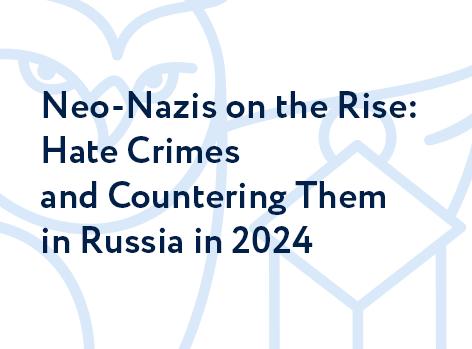The following is our monthly review of instances of xenophobia and radical nationalism, along with any government countermeasures, for April 2022.
We are aware of four individuals who suffered in ideologically motivated violence in May 2022, in Moscow and St. Petersburg. Since the beginning of this year, we have recorded cases in which a total of nine individuals were targeted in xenophobic attacks, and one who received a death threat.
This month we also recorded four incidents of violence against religious and ideological objects. Since the beginning of the year, we became aware of 11 such acts of xenophobically motivated vandalism.
The All-Russian Mayday Nationalists' Action was reduced to propaganda raids carried out by the Movement of Nationalists (DN) in Moscow, St. Petersburg and a few other cities (Voronezh, Krasnodar, Novorossiysk and Novosibirsk). Participants wrote graffiti including the slogans "Russia Without Putin and Russophobia" and "Stop Bringing Migrants," posted stickers with links to their Telegram channels, and handed out leaflets to passersby.
Some nationalist organizations celebrated Victory Day. Already on May 6, members of the Russian All-People’s Union (ROS), together with representatives of the Pridnestrovian Moldavian Republic (known in the West as Transnistria) in Moscow, the Omsk Territorial Community and the Slavic Academy, laid flowers at the tomb of the Unknown Soldier near the Moscow Kremlin walls. In total, about 50 people gathered with imperial and ROS flags. ROS leader Sergei Baburin addressed the crowd, calling on those present to remember those "fighting the Nazis in Ukraine." On May 9, activists from Conservative Russia in Yekaterinburg laid flowers "in memory of the Russian soldiers who defended Slavs' right to life."
In May, we have recorded one ruling delivered on the basis of a hate-motivated attack.(*) Since the beginning of 2022, we are aware of two cases in which two individuals were convicted on the basis of xenophobic violence in St. Petersburg and Tula, and another in which two individuals were convicted of xenophobic vandalism in the Tula Region.
Meanwhile, this month in Moscow, Sergei Taraskin, leader of the banned organization “SSSR” (“USSR,” also known as Union of Slavic Forces of Rus), was convicted for participation in the activities of an extremist organization. He was sentenced to eight years in prison. Under the same law (Article 282.2 of the Criminal Code), two prison colony inmates in Astrakhan received lengthened terms for participation in the banned movement AUE. In total, since the beginning of the year, we have recorded no fewer than 14 convictions of 27 people, for involvement in the activities of extremist communities and organizations.
We also have information relating to 11 convictions in May on the basis of xenophobic statements. Five individuals were convicted solely under Article 280 of the Criminal Code (public calls to extremist activity) on the basis of social-media posts calling for attacks on people of "non-Slavic appearance," migrants, law enforcement, and even, concretely, employees of penal colony No. 15 in the Novosibirsk Region and members of their families. Two individuals were convicted under Article 205.2 of the Criminal Code (public justification of terrorism online) for approvals of the bombing of the Arkhangelsk FSB headquarters carried out by anarcho-communist Mikhail Zhlobitsky.
One person, Ufa songwriter Andrei Masalsky, was fined under both forementioned statutes for calls "for violence towards employees of law enforcement agencies" and for the "commission of violent acts against Muslims."
Another individual received a suspended prison sentence under Article 282 of the Criminal Code (incitement to hatred) for repeated social-media publication of a post inciting hatred towards a social group.
Meanwhile one person was sanctioned following a combined charge under Articles 282 and 148 (insulting the religious feelings of believers) of the Criminal Code over posting of texts inciting "enmity and hatred towards a group of individuals identified by their attitude towards religion." Yet another person received a suspended prison sentence, on the same charge, over xenophobic comments on social media.
Since the beginning of 2022, we have counted no fewer than 62 court rulings convicting the same number of individuals on the basis of xenophobic statements.
The Federal List of Extremist Materials was expanded twice, on May 6 and 30, to account for new entries 5283–5287. New entries include songs calling for attacks on the police, by various artists popular among radical youth.
At a minimum, five individuals were fined under Article 20.29 of the Code of Administrative Offenses (manufacture and dissemination of banned materials) over sharing of materials included in the Federal List of Extremist Materials. These included white power-themed songs, "Anarchist Cookbook," and the slogan "Russia for ethnic Russians."
Also this month, no fewer than 13 individuals were fined under Article 20.3.1 of the Сode of Administrative Offenses (incitement to hatred), corresponding to the contents of Part 1 of Article 282 of the Criminal Code. (The criminal statute is invoked in the case of repeat offenses in the course of one year). These cases were brought as a result of social-media publication of materials directed at incitement of hatred of Jews, Yakuts, Azeris, Asians generally, natives of the Caucasus, ethnic Russians, the police and employees of the law enforcement agencies.
Finally, no fewer than 36 individuals were sanctioned under Article 20.3 of the Code of Administrative Offenses (propaganda and public demonstration of Nazi symbols and symbols of banned organizations). Twelve of them (including five prison colony inmates) had demonstrated their own swastika tattoos. Another five threw the fascist salute and shouted "Sig heil" in public places on Victory Day. Two drew graffiti swastikas on their apartment buildings, one scratched a swastika onto a car, and one displayed a Nazi symbol in the window of her apartment. Others posted Nazi symbols to social media. Eleven of these people were sentenced to administrative arrest, while the others were fined.
===============
(*) Data about criminal and administrative cases are reported without reference to rulings that we consider to be patently improper.




